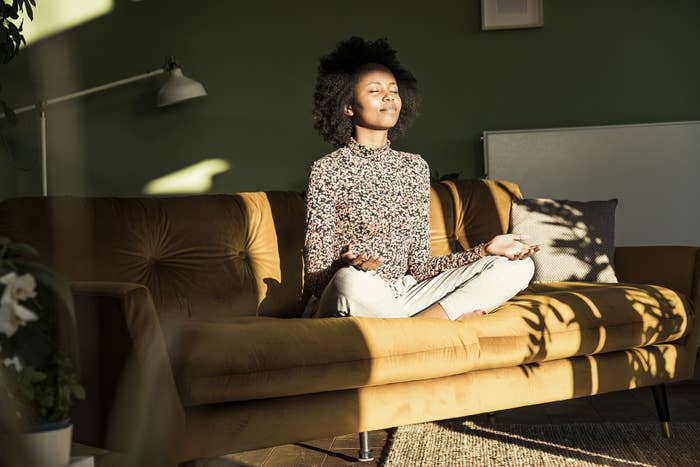
I don’t know about you, but for me, meditation has always seemed like a daunting task. When you’re an anxious overthinker who seeks constant distraction to avoid being alone with your own thoughts, it’s hard to imagine feeling at peace while attempting to quiet your brain.
I thought mediation was about “clearing your mind,” a common misconception that can deter people — particularly those who could benefit most — from getting into it.
“That’s why people think it’s so hard and have a really hard time dropping into a practice,” said Lihi Benisty, a teacher of yoga, breathwork, and meditation at Open, a mindfulness studio based in Venice, California.
What is meditation?
People often feel like they can’t meditate because they’re too stressed or busy to clear their mind, when in reality meditation is a practice to observe what is on the mind rather than trying to push it out.
“It’s not supposed to look like or be anything. You’re not supposed to sit still and be really happy and zen,” Benisty said. “Sit with it, stand with it, lay with it. Surrender to what is there because when you're actually facing that stuff, you can create a relationship with it that’s not overpowering… If you’re sitting there in an anxiety attack, let it happen. That’s the true nature of it.”
Basically, meditation helps you to pay attention to your thoughts and emotions without trying to grasp onto positive experiences or avoid the discomfort of negative ones. You acknowledge and observe any thoughts without emotion before returning your attention to your breath or some other focal point.
In fact, research suggests that the practice of meditation protects against reactivity in the amygdala, the part of the brain that responds to fear and threatening stimuli, and experts say it can be a powerful tool for better mental health.
Given all of the potential health perks, my excuses not to try meditating no longer seem valid, and it’s highly possible that yours don’t either.
Why meditate?
There’s a reason that many mental health practitioners, like psychiatrist Anjali Dsouza of the District Center for Integrative Medicine, are incorporating mindfulness and meditation into their treatment plans.
When considering tools outside of the conventional medical model to treat mental health conditions like anxiety and depression, Dsouza said meditation is the first one she goes to after nutrition and lifestyle.
Anxiety often involves worrying about the future and depression can include ruminating on the past, she said, and both have high rates of symptom recurrence when using traditional medicine. “As you're practicing something like mindfulness and allowing yourself to know how to be more present, it's literally cultivating this state of being that is protected against specifically anxiety and depression.”
Meditation allows us to step out of that flow of thoughts and emotion and helps break the patterns of thinking and feeling that are so wrapped up in psychological conditions like anxiety or depressive symptoms, said Kirk Warren Brown, a social psychologist whose research examines the role of mindfulness in psychological, physical, and social well-being.
“What's going on in the brain seems to support that it helps to kind of disengage from what’s called the default mode network in the brain,” said Brown, who is also a professor of psychology at Virginia Commonwealth University. The DMN is the network of brain regions that operate when we're not engaged in a task of some kind, such as when your mind wanders, daydreams, or ruminates, and other thought patterns that can contribute to psychological distress.
Kama Hagar, a certified holistic wellness coach with her own virtual practice, noted that meditation can lower levels of the stress hormone cortisol, which may help psychiatric disorders, peptic ulcers, migraines, and other conditions exacerbated by stress.
How to meditate
Dsouza recommended that you get started and play around with meditation until you figure out what works with your personality and lifestyle. You can test out breathing techniques since they don’t require much guidance or time — like 4-7-8 breathing, which means you breathe in for four counts, hold your breath for seven, and breathe out with pursed lips for eight.
“Don’t try to do an hour of meditation every day. Try to do two minutes,” Benisty said. “Do what you can do. Don’t try to overdo it. But also, you have time. Everyone has time.”
Brown noted that you can be mindful in any activity. While most people associate meditating with sitting on a cushion and watching your breath, you can transform many other habits you enjoy like gardening, listening to music, or taking a bath into opportunities to tune into the body, mind, and heart.
“Learning to meditate or become more mindful is like learning how to become physically fit,” he said. “It takes time, and it can be a little painful at the beginning when we're training our bodies or, in this case, training our minds.”
Brown’s advice is to give it at least a month of regular practice and see what kind of changes you observe in how you're thinking, feeling, and behaving toward other people and toward yourself.
When it comes to tools that may aid in your practice, Hagar advised using whatever you need, just make sure it’s a conscious purchase. While you don’t need to purchase anything at all to meditate, here are some expert-recommended products that may help you get started or enhance your existing practice.
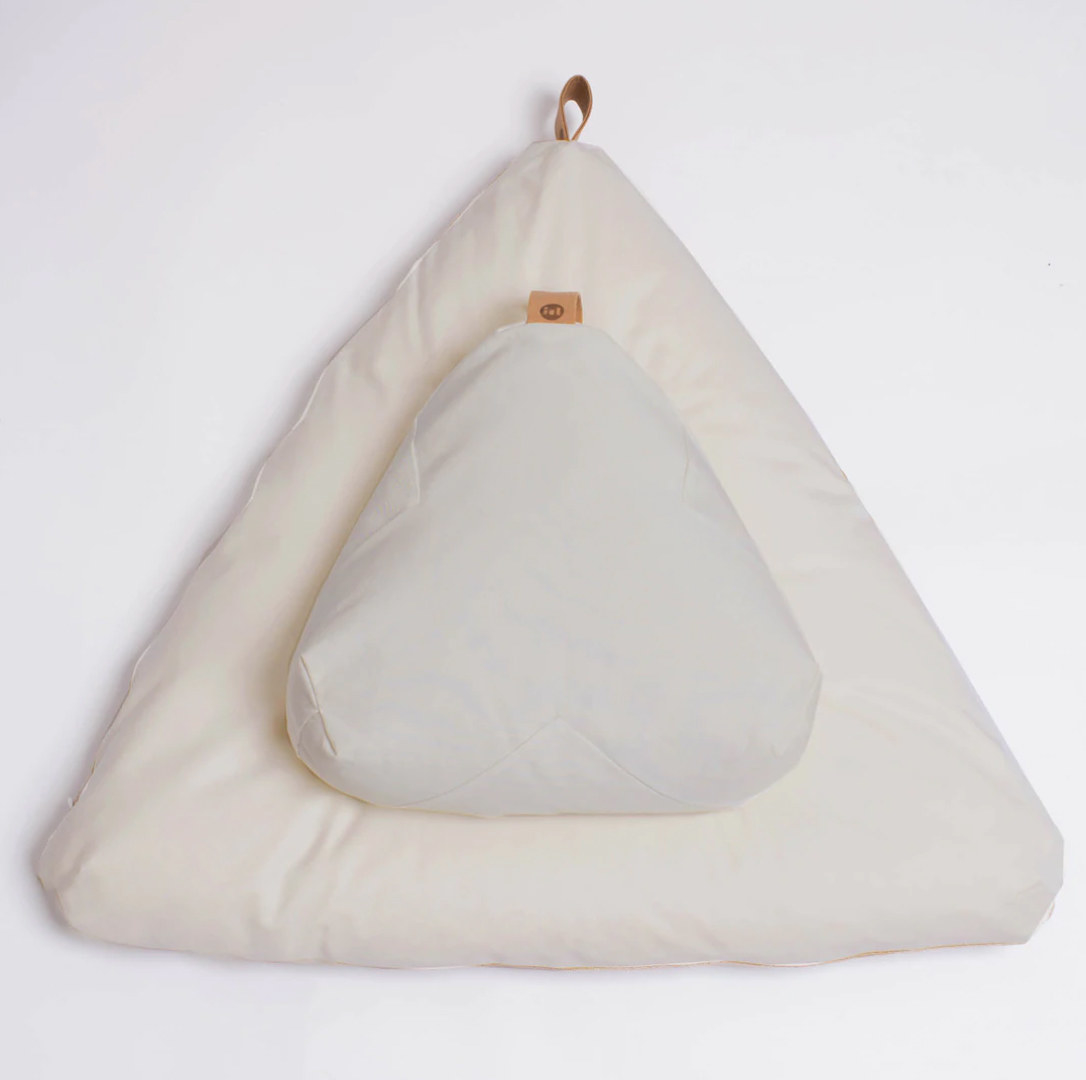
Yes, meditation does not always require the clichéd image of cross-legged stillness, but for some, that may be what they need to stick with it. “The reason I think sitting meditation is commonly recommended is that, in a sense, you've committed your mind to doing just this one thing for some period of time,” Brown said.
If you want to make that commitment and create a comfortable environment for your meditation practice, this cushion set is one of Benisty’s favorites for a beautiful and supportive space. It’s made from 100% organic cotton canvas and filled with organic cotton batting or buckwheat husks. The outer covers are also removable and washable.
Promising review: “Wow… what a magnificent meditation cushion set. From the moment I sat down for the first time, I’m in love. It’s so comfortable and the color is gorgeous. No longer do my legs fall asleep. If you’re looking for an organic, high quality meditation cushion, look no further. This one is the best!” —Stacy C. via Project Full
What else to consider: If you’re worried about not having the floor space to keep these out all the time or not liking how that looks, both cushions have leather loops that allow you to hang them up when not in use.
Best for: those interested staying comfortable and supported for a seated meditation.
You can buy the Project Full Meditation Cushion Set from Brookstone for around $299.
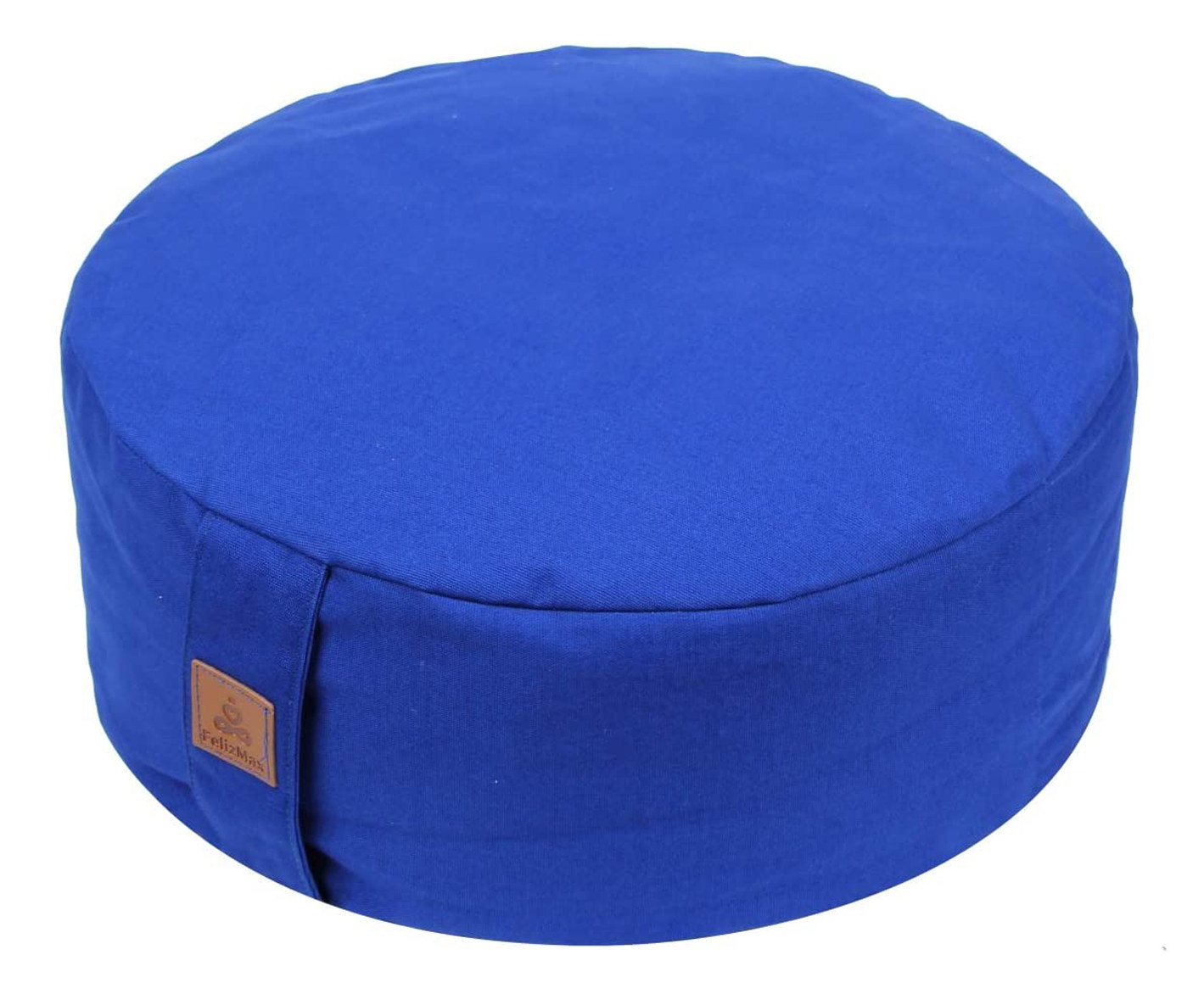
If you’re eager to start your practice ASAP and feel that you need a more affordable meditation pillow to facilitate that, you can grab this zafu cushion on Amazon and have it in two days or less. It comes in six colors and two sizes, all with washable covers that unzip so that you can add or remove the buckwheat hull filling to achieve your desired comfort/support level. It also has thousands of 5-star reviews on Amazon with tons of positive feedback from satisfied customers.
Promising review: “Really like that this cushion is comfortable and helps with your posture when meditating.” —Annie 1076
What else to consider: Try not to get the buckwheat filling wet, as that may cause mold or mildew to grow.
Best for: anyone seeking a more affordable yet supportive buckwheat meditation pillow.
You can buy the Zafu Buckwheat Meditation Pillow from Amazon for around $28.
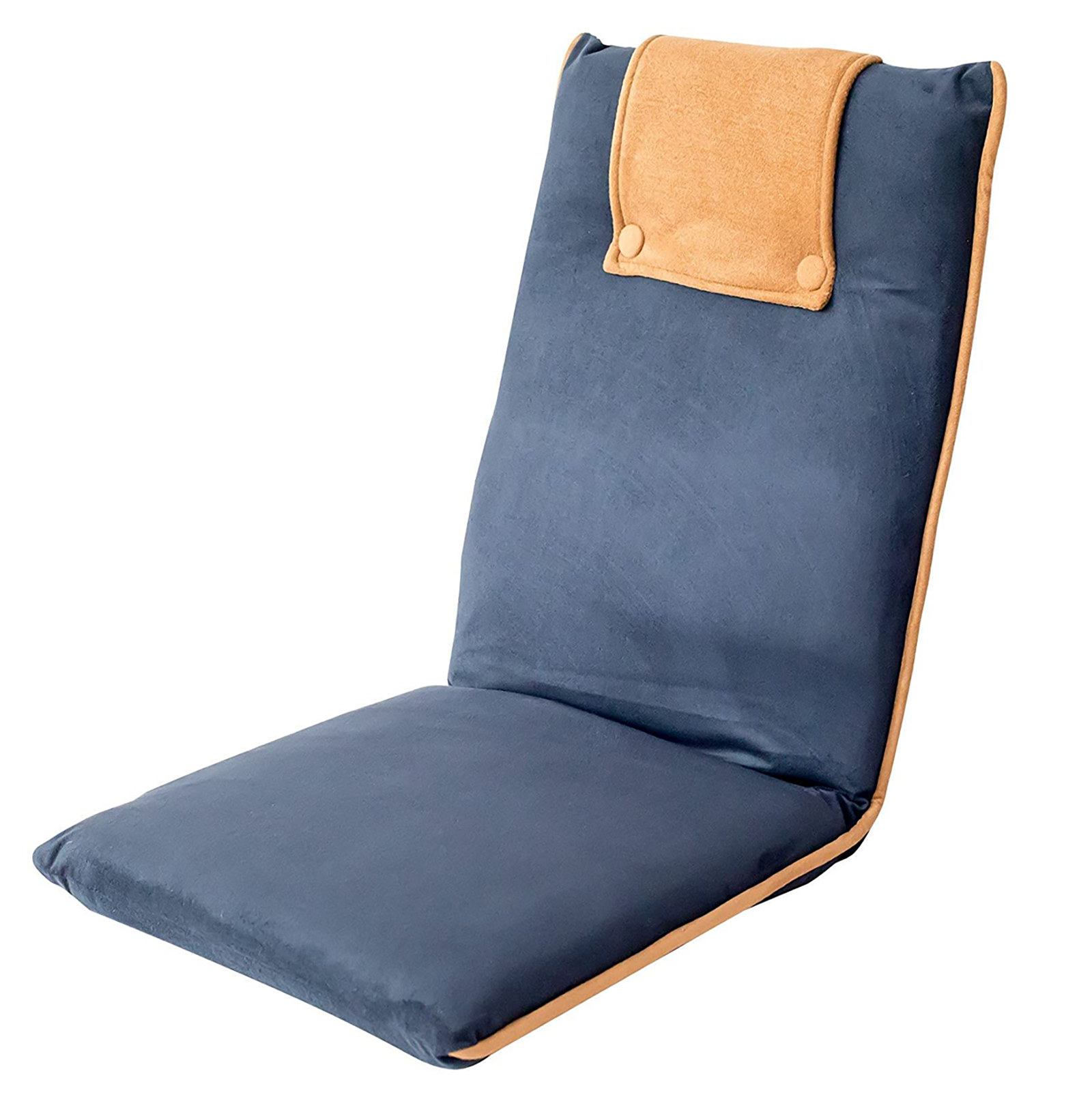
If you need back support no matter where you’re sitting, this meditation chair from Amazon has padding and a tall back for a more comfortable experience. You can adjust it until you find the angle that best supports your back and posture, or even push the back down until it’s completely flat when you want to lie down.
Promising Review: “Very comfortable, especially for someone who has significant back problems. I can sit for longer periods of time to meditate without being so uncomfortable that I can’t concentrate on what I’m doing. Great product for the price.” —Rochelle C-W
What else to consider: The primary complaints seem to surround the quality of the cushion or how long it lasts, but if you’re only using it for meditative purposes, it should hold up just fine.
Best for: those who require back support during seated meditation.
You can buy the bonVIVO II Meditation Chair from Amazon for around $70.
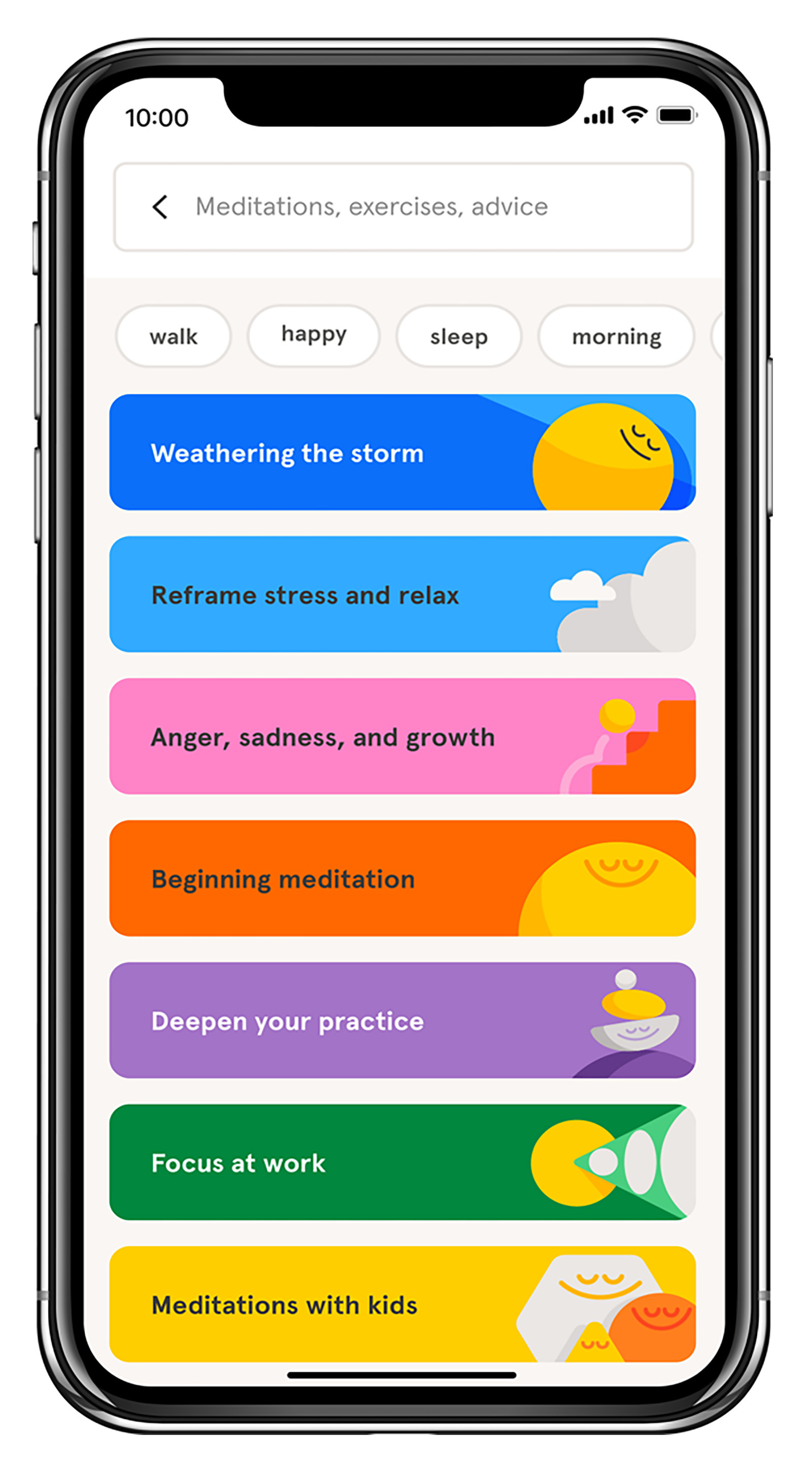
Every expert we spoke with suggested trying guided meditation, and apps are a great resource that you can tap into anywhere, at any time. If you want a free meditation app, they all mentioned Insight Timer, which has thousands of guided meditations and more to play with. However, the two most popular for a more curated experience are Calm and Headspace, which offer some free content but subscriptions or upgrades are needed for more access. (There’s also the Breathe app on Apple watches.) Headspace in particular gets rave reviews from users and experts alike. It uses science-backed meditation and mindfulness tools to help you create healthier habits with a constantly updating library of courses and audio guides.
Promising review: “As someone who was a vicious doubter, non-believer, and did not think it was humanly possible to get me to sit still for even 1 minute — I didn’t realize that the thing that I was most resistant to, was actually the thing that I needed the most. I am now going on 3 years with Headspace happier, healthier (used to suffer from terrible GERD), more compassionate, resilient, focused, and more.” —Nicoco218 via Apple App Store
What else to consider: Another perk that our experts noted about apps is that they can send you little notifications and reminders, which can be hugely helpful if you’re struggling to stick to your practice.
Best for: anyone willing to invest in a convenient, diverse tool to help guide their meditation.
You can subscribe to Headspace for around $69.99 per year (or $5.83 per month).
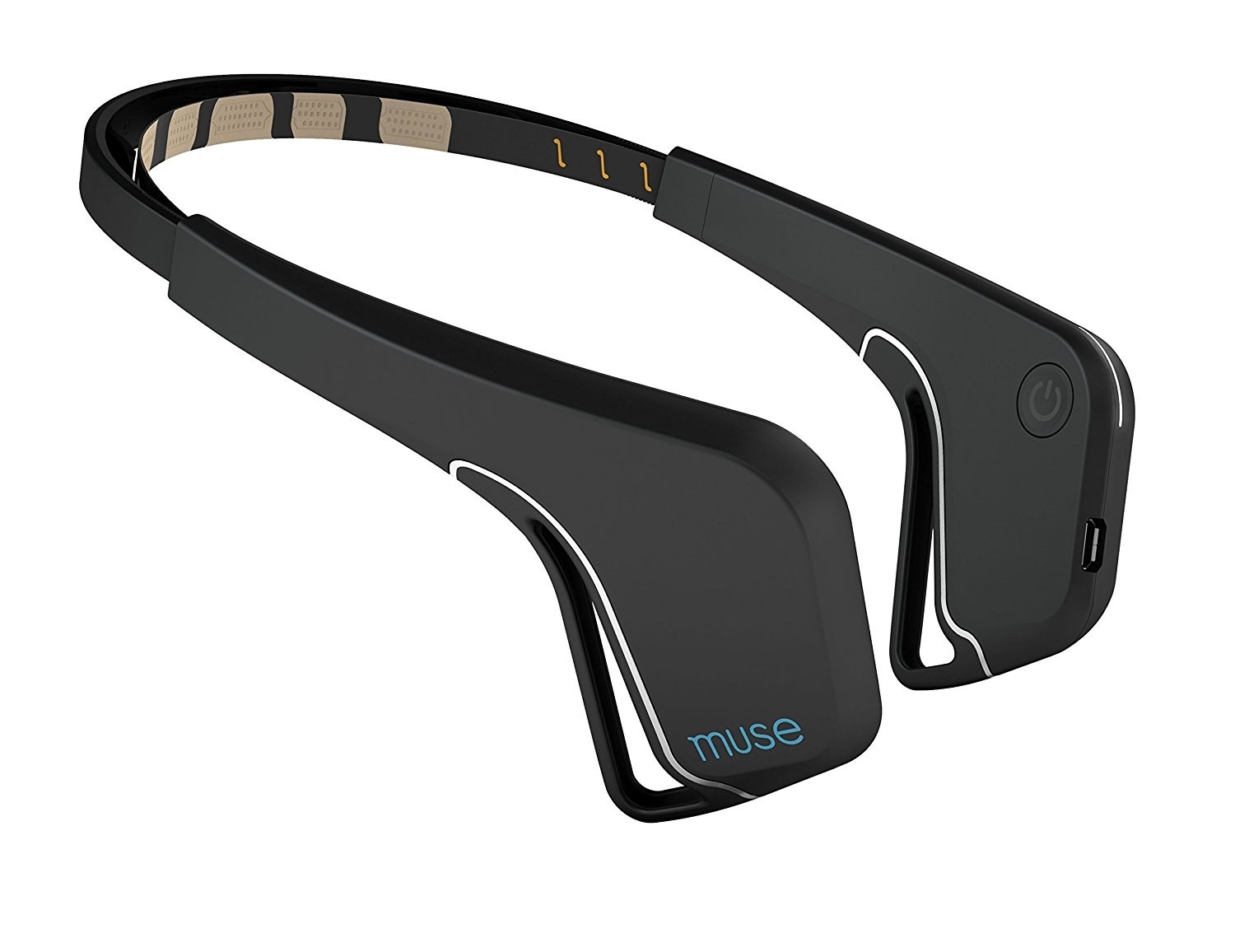
Muse may be the perfect option if you want something in between the commitment of a seated meditation space and the flexibility of a stand-alone app. You can take this meditation headband with you wherever you go, yet it’s still something you have to choose to put on when it’s time to meditate. Dsouza said it provides feedback that can help you understand when your mind is calm and what helped you get there by reviewing your data after each session. You can also set goals to help progress and build a rewarding meditation practice.
Promising review: “Really an AWESOME product! I use it almost everyday (currently on a 17 day streak trying to hit 100), and it really is amazing. It puts you in an amazing zone with all of the adjusting to your frequencies. Would recommend to ANYONE!!” —Jimmy
What else to consider: Some reviewers felt that their Muse was defective or simply didn’t find it to be helpful in aiding their meditation, but others really appreciated having something to hold them accountable and at the very least challenge them to continue their streaks.
Best for: someone who wants a more tangible tech tool to not only guide, but also offer data and feedback to track their progress.
You can buy the Muse Meditation Headband from Muse for around $250.
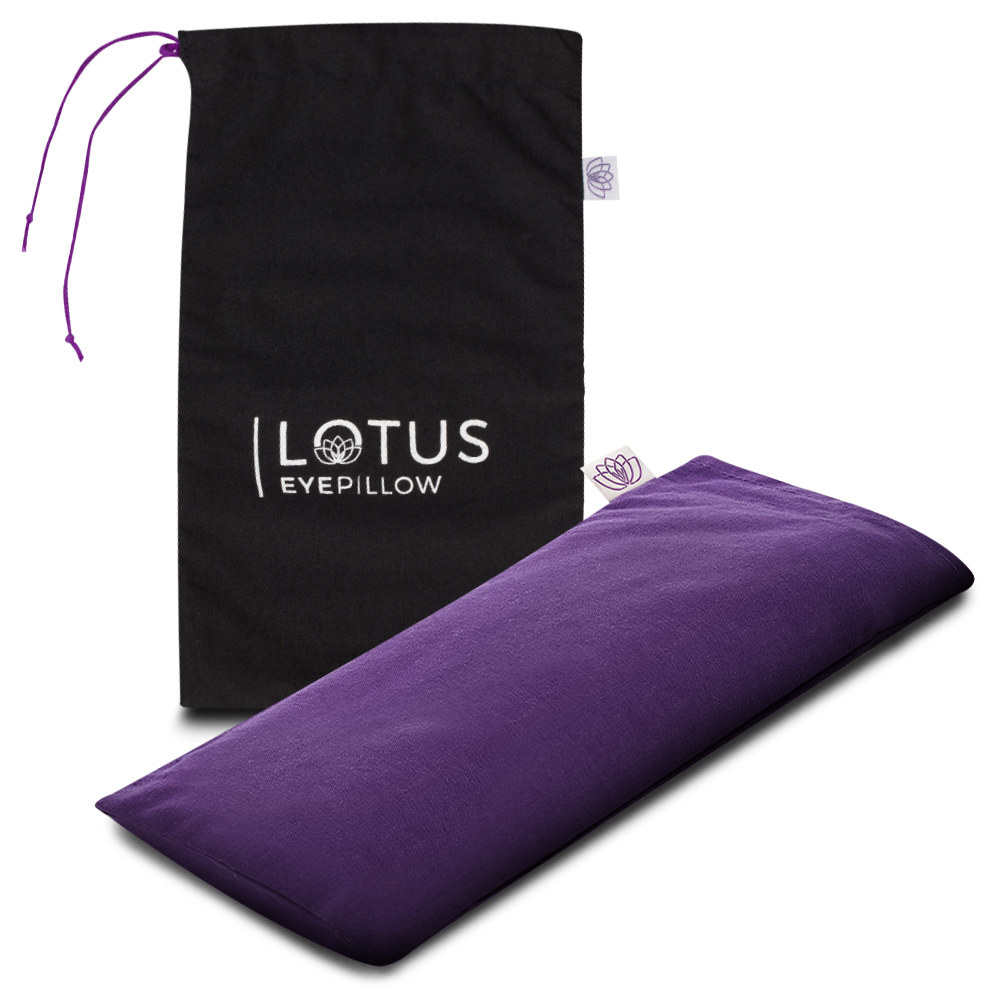
Dsouza’s all-time favorite product for meditating is a weighted eye pillow.
“The power of touch is very, very powerful in creating this calming parasympathetic response,” she said. “Just having a weighted eye pillow can add an extra layer of like, let me just close down the stimuli, pause for one second and reset my body. People love that. It's really powerful and so easy.”
She also mentioned that hers is lavender scented, like this option that’s filled with flax seeds for gentle, eco-friendly pressure. The covers come in several colors and are all removable to hand wash as needed. You can even heat it up in the microwave or stick it in the freezer if you want some additional warm comfort or cooling relief while you shut out the world.
Promising review: “The lavender scent promotes relaxation and calming effects. The pillow has the perfect amount of pressure over your eyes which helped relieve headaches. I put it in the freezer for about an hour before I used it. It was perfect.” —gloria ramirez
What else to consider: Some reviewers mentioned that the lavender scent is fairly strong, so if you’re not a fan of lavender, it’s probably not the best choice for you.
Best for: anyone who enjoys a bit of pressure, darkness, and aromatherapy to get into their meditative state.
You can buy the Lotus Weighted Lavender Eye Pillow from Amazon for around $22.
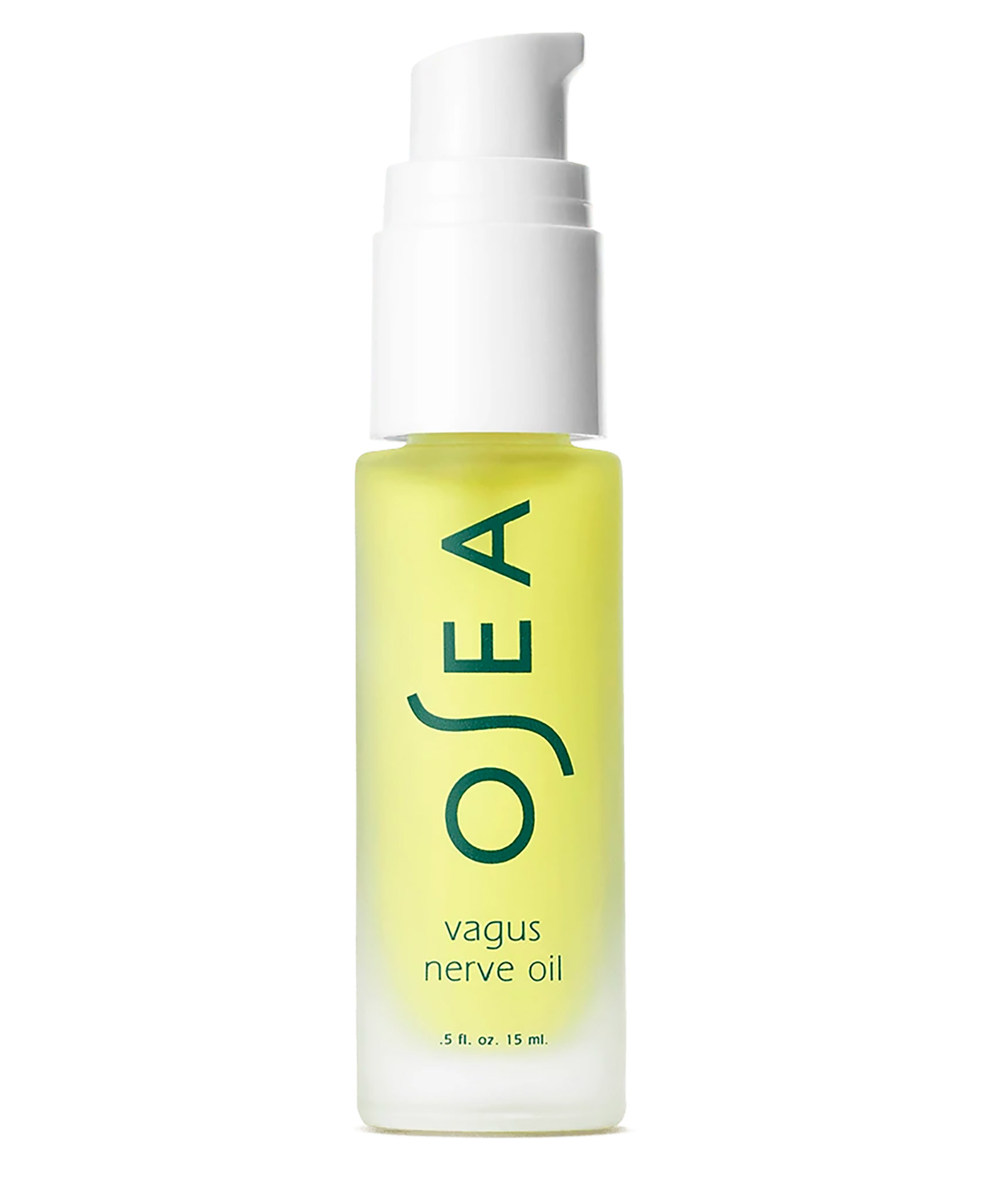
This oil is another one of Benisty’s favorite products to aid in relaxation and calming nerves. While I haven’t used this particular product, I have tried many other Osea skincare products, all of which I have loved. The intended use of this oil is to rub it together in your hands before cupping them to your nose and inhaling, and then lightly massaging it into your neck or behind your ears. This combination of essential oils is intended to activate the body’s relaxation response and help regulate stress, which may be ideal benefits for meditation.
Promising review: “Love this product, it delivers on its claim as a calming agent! I purchased the Vagus Nerve Collection as I needed extra help with stress, teeth clenching, and an old injury where I was kicked in the jaw by a horse resulting in chronic jaw pain. Use this as a nighttime ritual after a short meditation and I no longer have jaw pain! And yes… the scent is wonderful as is the vagus nerve pillow mist! Thank you Osea!” —Lulu D via Osea
What else to consider: Yes, this product is a splurge. It’s a lot to pay for a small bottle, but a little goes a long way and most customers felt that it was worth the money. Many also noted that it helps relieve their neck or jaw pain when used as a massage oil.
Best for: fans of aromatherapy who find it helpful to breathe in calming scents when getting into a meditative state.
You can buy Osea Vagus Nerve Oil from Osea for around $48.
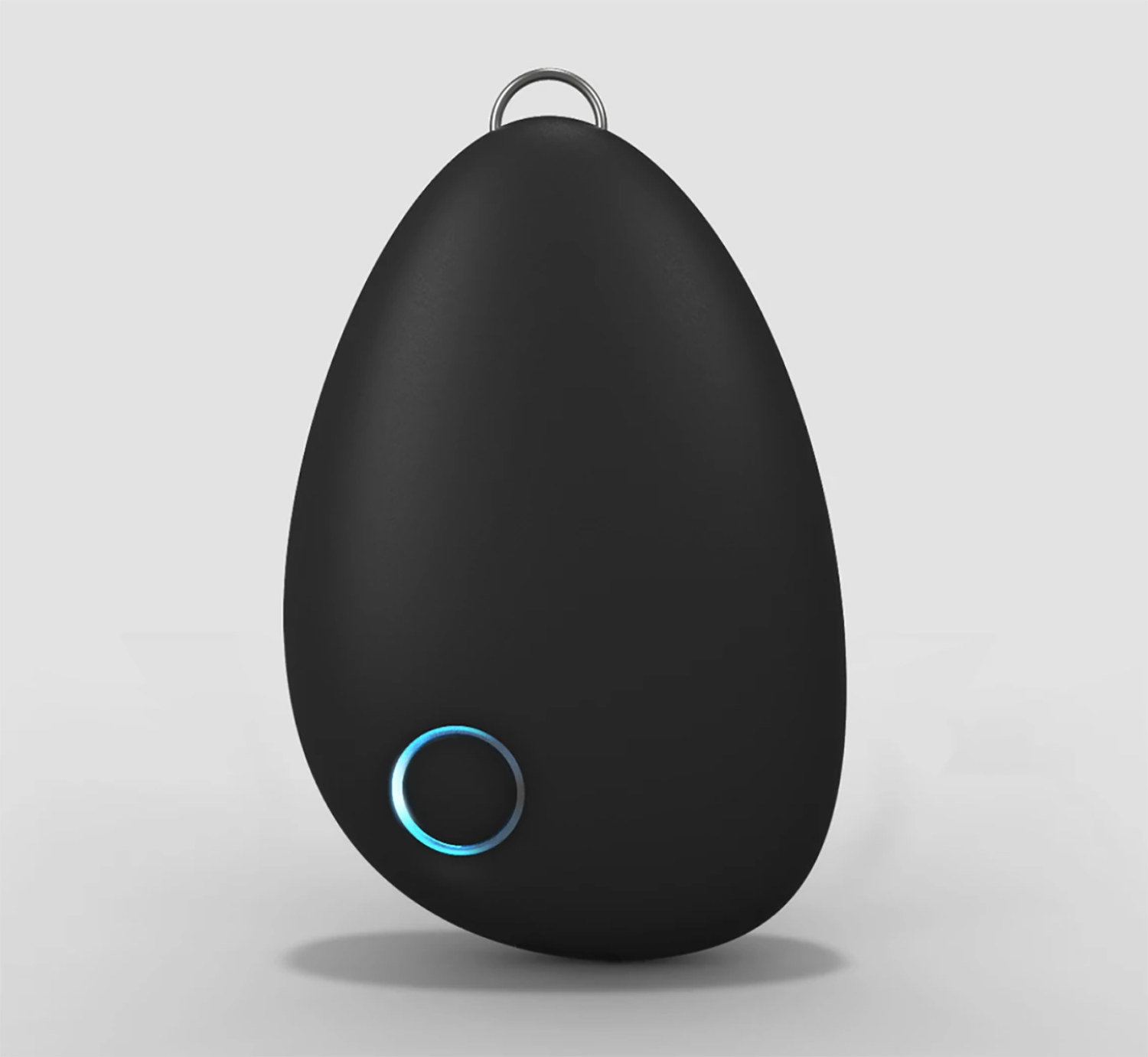
Another tangible tech device recommended by Dsouza is the Sensate Pebble. According to Dsouza, “It’s a lovely device that actually creates some vibrational experiences from a sensory perspective… It gives you a little bit something to hold on to beyond just your breath, and that can be really grounding for some people.”
You can connect to the Sensate app to engage in a 10-minute daily session that can help calm nerves, reduce stress, and get better sleep. Simply lie down, place it on your sternum, and let the low-frequency vibrations focus your meditation.
Promising review: “Sensate had a profound effect in calming me. It was quite amazing. For someone who has long struggled to meditate, this is an extraordinary outcome.” —Michelle M. via Sensate
What else to consider: This may seem like a high price to pay for an unassuming device, but it seems like if it works for you, it really works.
Best for: those who want a wearable, portable relaxation aid.
You can buy the Sensate Pebble from Sensate for around $250 or from Amazon for around $299.
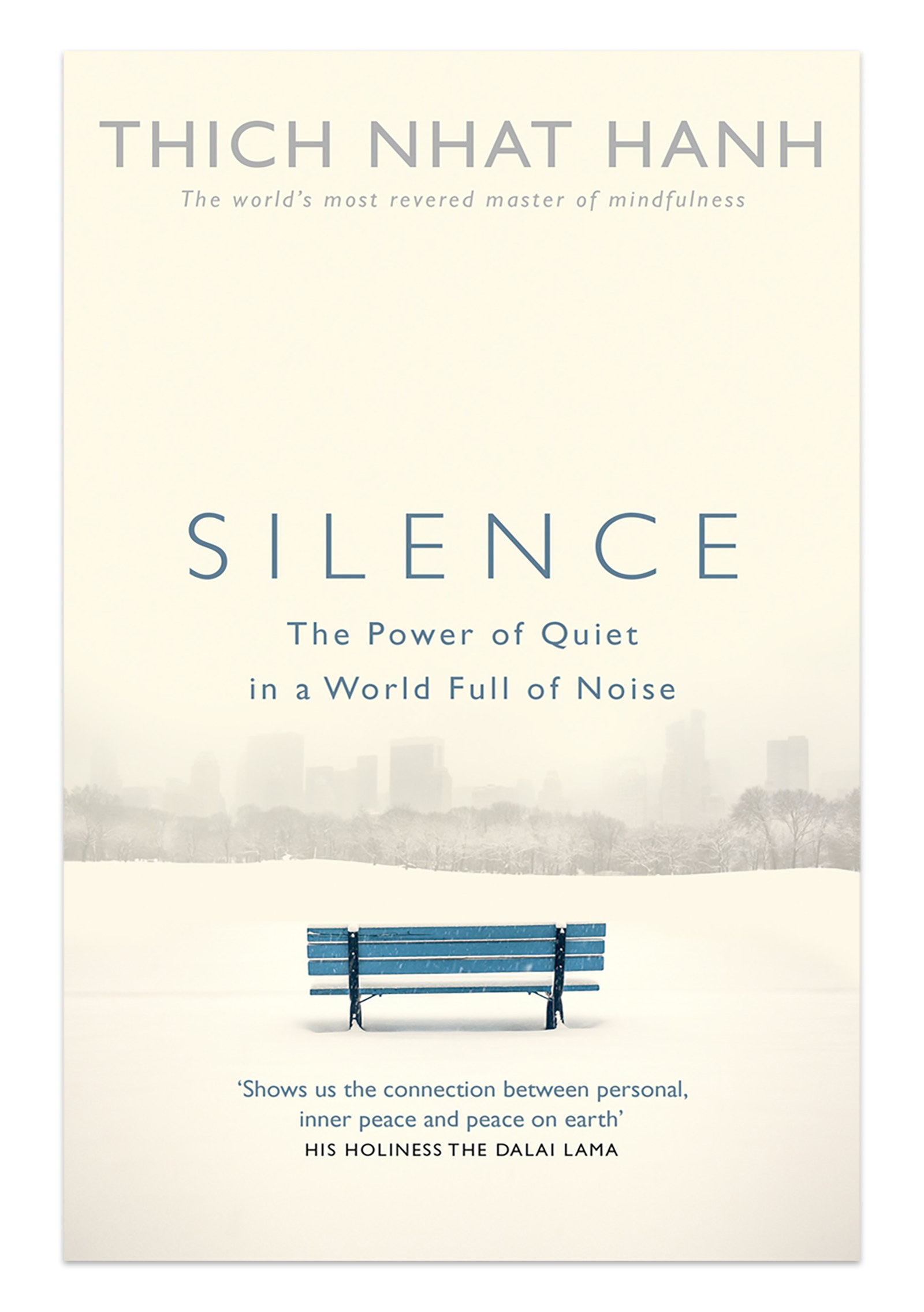
Books are obviously a great tool to help us understand unfamiliar topics. If you’re new to meditation, or even an expert looking to deepen your knowledge, Benisty highly recommends this book. The author, Thích Nhất Hạnh, is a Buddhist monk and Nobel Peace Prize nominee who explains how mindfulness can help stop the noise inside your head. The description reads, “With gentle anecdotes, simple Buddhist wisdom and practical exercises, he shows us how to live mindfully so that all the internal chatter ceases and we are left with the eloquent sound of silence.”
Promising review: “Very interesting theory. The author taught us a very simple way to practice mindfulness. Great help to the working class.” —Barefoot
What else to consider: Don’t just trust Benisty. This book has over 1,000 reviews on Amazon and a nearly unanimous 5-star rating.
Best for: readers or anyone who finds books to be a more digestible way to learn about and understand a new interest on their own time.
You can buy Silence: The Power of Quiet in a World Full of Noise from Amazon for around $11.
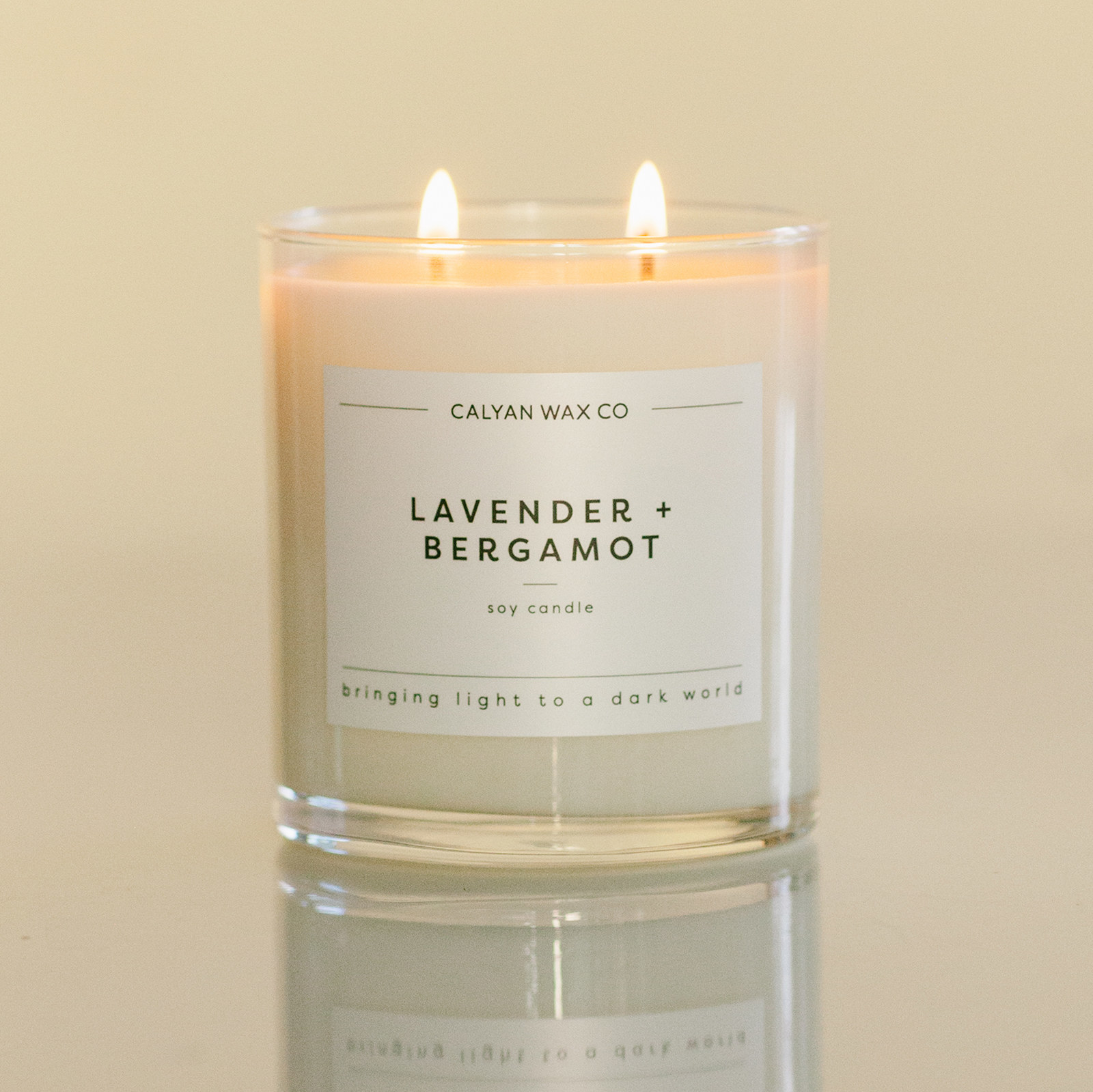
What would any shopping list be without a candle? But really, when it comes to meditation and relaxation in general, nothing sets the mood quite like a candle. Benisty said essential oils or candles are always a beautiful way to anchor yourself through your senses.
“That’s one of the five rules of mindfulness, is just actually being with your senses,” she said. “Get anything that can make you feel like you're here and it's a pleasurable experience. I love scents and aromatherapy for that reason.”
Dsouza specifically mentioned lavender and bergamot as two scents that are known to be calming, which is always welcome in meditation. This candle is a mix of both, with notes of citrus and cedar as well. It also looks elegant and promises to have a long life.
Promising review: “These are perfect for those who want a light clean nice scent that's non toxic, safe and good for those with sensitivities and allergies!” —Renee
What else to consider: Candles don’t necessarily have a ton of scientific backing when it comes to meditation aids, but they’re generally lovely, multifunctional, and do a good job of creating a vibe. Some reviewers noted that the scent isn’t very strong, so if you like a candle that doesn’t overwhelm you, it’s a good option.
Best for: candle lovers or anyone who finds lavender and bergamot to be relaxing scents.
You can buy the Calyan Wax Lavender and Bergamot Scented Candle from Amazon for around $23.
